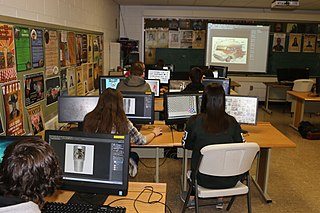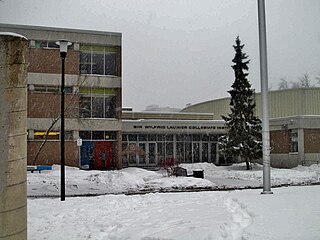Related Research Articles

A CEGEP is a publicly funded college providing technical, academic, vocational or a mix of programs; they are exclusive to the province of Quebec's education system. A loanword from French, it originates from the French acronym for collège d'enseignement général et professionnel, sometimes known in English as a "General and Vocational College"—it is now considered a word in itself.

Education in the Netherlands is characterized by division: education is oriented toward the needs and background of the pupil. Education is divided over schools for different age groups, some of which are divided in streams for different educational levels. Schools are furthermore divided in public, special (religious), and general-special (neutral) schools, although there are also a few private schools. The Dutch grading scale runs from 1 to 10 (outstanding).

Education in Canada is for the most part provided publicly, funded and overseen by federal, provincial, and local governments. Education is within provincial jurisdiction and the curriculum is overseen by the province. Education in Canada is generally divided into primary education, followed by secondary education and post-secondary. Education in both English and French is available in most places across Canada. Canada has a large number of universities, almost all of which are publicly funded. Established in 1663, Université Laval is the oldest post-secondary institution in Canada. The largest university is the University of Toronto with over 85,000 students. Four universities are regularly ranked among the top 100 world-wide, namely University of Toronto, University of British Columbia, McGill University, and McMaster University, with a total of 18 universities ranked in the top 500 worldwide.
The Ontario Academic Credit (OAC), which may also be known as 12b was a fifth year of secondary school education that previously existed in the province of Ontario, Canada, designed for students preparing for post-secondary education. The OAC curriculum was codified by the Ontario Ministry of Education in Ontario Schools: Intermediate and Senior (OS:IS) and its revisions. The Ontario education system had a final fifth year of secondary education, known as Grade 13 from 1921 to 1988; grade 13 was replaced by OAC for students starting high school in 1984. OAC continued to act as a fifth year of secondary education until it was phased out in 2003.
Ninth grade is the ninth or tenth year of formal or compulsory education in some countries. It is generally part of middle school or secondary school depending on country. Students in ninth grade are usually 14–15 years old, but in some countries are 15–16.

Twelfth grade is the twelfth year of formal or compulsory education. It is typically the final year of secondary school and K–12 in most parts of the world. Students in twelfth grade are usually 17–18 years old. Some countries have a thirteenth grade, while other countries do not have a 12th grade/year at all.

Almaty International School (AIS) is a private school located in Almaty, Kazakhstan. Founded by QSI in 1993, it is the third largest school out of all the QSI schools. The school offers an American-based Pre-K and K-12 programs. School facilities include: an elementary building, secondary building, annex, small gym, big gym, library, cafeteria, birch room, birch tree area, field with an Olympic size track, 3 playgrounds, and the teachers apartments. The school hosts international events and participates in many sports events such as the CAXC, CASC, CABC, and CAVC. The school is also used as a site for SAT, PSAT and AP testing. The school is operated with the authorization of the Kazakhstani Government.

The Toronto French School (TFS), founded in 1962, is an independent, bilingual, co-educational, non-denominational school in Toronto, Ontario, Canada. Charles III, as King of Canada, is the royal patron of the school. The school rebranded in 2011 to become TFS – Canada's International School.
The Ontario Secondary School Literacy Test is a compulsory standardized test for secondary school students in Ontario who wish to obtain the Ontario Secondary School Diploma. For students who entered Grade 9 in 1999–2000, successful completion of the test was not a graduation requirement. However, for those students who took the field test of the OSSLT in 2000–2001, failed the test, and chose to retake the OSSLT in October 2001, successful completion of the provincial literacy graduation requirement became a diploma requirement. It is administered by the Education Quality and Accountability Office (EQAO).

DSC International School, formerly the Delia School of Canada, is a Canadian private school in Hong Kong, China.

Sir Wilfrid Laurier Collegiate Institute, initially known as Guildwood Secondary School is a high school in Toronto, Ontario, Canada. It is located in the Guildwood neighbourhood in the southern part of the former suburb of Scarborough. It is named in honour of Sir Wilfrid Laurier, the seventh Prime Minister of Canada. The school was established by the Scarborough Board of Education, and is now part of the Toronto District School Board. The motto of the school Hoc Tempus est Tibi which translates into English as "This Time is for You".
The West African Senior School Certificate Examination (WASSCE) is a type of standardized test in West Africa. Students who pass the exam receive a certificate confirming their graduation from secondary education. It is administered by the West African Examinations Council (WAEC). It is only offered to candidates residing in Anglophone West African countries. The academic school-leaving qualification awarded upon successful completion of the exams is the West African Senior School Certificate.
In South Africa, matriculation is the final year of high school and the qualification received on graduating from high school, and the minimum university entrance requirements. The first formal examination was conducted in South Africa under the University of the Cape of Good Hope in 1858. In general usage, the school-leaving exams, which are government-administered, are known as the "matric exams"; by extension, students in the final year of high school are known as "matriculants" or, more commonly, "matrics". Once the Matric year has been passed, students are said to have "matriculated".
Education in Ontario comprises public and private primary schools, secondary schools and post-secondary institutions. Publicly funded elementary and secondary schools are administered by the Ontario Ministry of Education, while colleges and universities are administered by the Ontario Ministry of Training, Colleges and Universities. The current respective Ministers for each are Stephen Lecce and Ross Romano. The province's public education system is primarily funded by the Government of Ontario, with education in Canada falling almost entirely under provincial jurisdiction. There is no federal government department or agency involved in the formation or analysis of policy regarding education for most Canadians. Schools for Indigenous people in Canada with Indian status are the only schools that are funded federally, and although the schools receive more money per individual student than certain provinces, the amount also includes the operation and maintenance of school facilities, instructional services, students supports and staff. Most provincial allocations per students do not include the maintenance and operation of buildings, as most provincial governments offer additional grants.
TVO ILC is the Canadian province of Ontario's designated provider of distance education and the exclusive provider of General Educational Development (GED) Testing in Ontario.

Father Leo J. Austin Catholic Secondary School is a coeducational, Catholic, secondary school located in Whitby, Ontario, Canada, and it is managed by the Durham Catholic District School Board (DCDSB). Today, it is an active school and is open for students grade 9 to 12. It’s one of the Catholic high schools in the DCDSB to offer the French Immersion program which draws students around the Durham Region.
Baku International School (BIS) is a school located in Baku, Azerbaijan, which was established by the Quality Schools International (QSI) group in 1994. The school provides preschool education, elementary education, middle school, and secondary education. The school programs are accredited by the Middle States Association of Colleges and Schools (MSA) in the United States.
A high school diploma is a diploma awarded upon graduation of high school. A high school diploma is awarded after completion of courses of studies lasting four years, typically from grade 9 to grade 12. It is the school leaving qualification in the United States and Canada.
References
- 1 2 https://files.ontario.ca/edu-ontario-schools-policy-programs-2016-en-2022-01-19.pdf [ bare URL PDF ]
- ↑ "High school graduation requirements". www.ontario.ca. Archived from the original on November 17, 2020. Retrieved October 7, 2020.
- ↑ "Ontario Secondary School Diploma Requirements". ocdsb.ca. Archived from the original on December 2, 2020. Retrieved October 7, 2020.
- ↑ "Adult learning: Ontario high school diploma". www.ontario.ca. Archived from the original on October 10, 2020. Retrieved October 7, 2020.